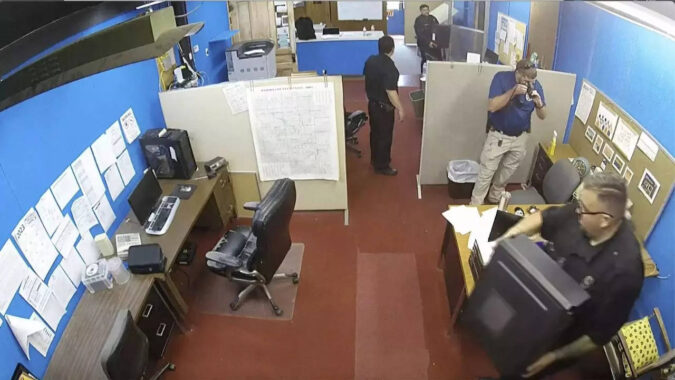Forced to rewrite wholescale stories and ads from scratch, the four-person newsroom toiled overnight to print Wednesday’s edition, with a defiant front-page headline that read: “SEIZED…but not silenced.” Under the 2-inch-tall typeface, they published stories on the raid and the influx of support the weekly newspaper has since received.
On Wednesday, Marion County Attorney Joel Ensey said his review of police seizures from the Marion County Record offices found “insufficient evidence exists to establish a legally sufficient nexus between this alleged crime and the places searched and the items seized.”
“As a result, I have submitted a proposed order asking the court to release the evidence seized. I have asked local law enforcement to return the material seized to the owners of the property,” Ensey said in a news release.
Last week, a police raid of the newspaper’s offices, and the home of its editor and publisher, foisted the town into the center of a national debate about press freedom, with watchdog groups condemning the department’s actions. Eric Meyer, the publisher, believes the raid was carried out because the newspaper was investigating why the police chief left his previous post as an officer in Kansas City, Missouri.
Police Chief Gideon Cody left the Missouri department earlier this year and began the job in Marion in June. He has not responded to interview requests.
Asked if the newspaper’s investigation of Cody may have had anything to do with the decision to raid it, Bernie Rhodes, the newspaper’s attorney, responded: “I think it is a remarkable coincidence if it didn’t.”
The Kansas Bureau of Investigation is leading the investigation into the raid and what allegedly prompted it. A search warrant suggests it was over the newspaper’s examination of a local restaurant owner. On Wednesday, the state agency said its investigation remains open, but authorities will continue their work without examining any of the evidence seized last Friday. Once the state investigators finish their work, they will turn their findings over to prosecutors for possible charges.
The sheriff on Wednesday released the seized items to a forensic auditor hired by the newspaper’s attorney to determine whether information on computers, cellphones and other equipment was copied.
TV and print reporters joined the conversation Wednesday in what is normally a quiet community of about 1,900 residents.
Even the White House weighed in. “This administration has been vocal about the importance of the freedom of press, here and around the globe,” White House press secretary Karine Jean-Pierre said at her daily briefing on Wednesday. “That is the core value when you think about our democracy, when you think about the cornerstone of our democracy, the freedom of press is right there.”
She said the raid raises “a lot of concerns and a lot of questions for us.”
The newspaper’s publisher said all of the returned equipment will be forensically audited to make sure that nothing is missing or was tampered with.
“You cannot let bullies win,” Meyer said. “And eventually, a bully will cross a line to the point that it becomes so egregious that other people come around and support you.”
He added, “We have a staff that’s very experienced, including myself, and we’re not going to take crap.”
Meyer has said that the stress from the raid of his home caused the death Saturday of his 98-year-old mother, Joan, the paper’s co-owner.
To put out the Wednesday edition of the paper, journalists and those involved in the business side of the newspaper used a couple of old computers that police didn’t confiscate, taking turns to get stories to the printer, to assemble ads and to check email. Because electronics were so scarce, it took the newsroom until 5 a.m. to finish the paper, said Emily Bradbury, the Kansas Press Association’s executive director. Bradbury chipped in herself by answering phones and ordering meals for staffers.
“There were literally index cards going back and forth,” said Rhodes, who was also in the office. “They had all the classified ads, all the legal notices that they had to recreate. All of those were on the computers.”
The newspaper’s press run is normally 4,000 papers but since the raids they have received more than 2,000 new subscriptions, Meyer said.
At one point, a couple visiting from Arizona stopped at the front desk to buy a subscription, just to show their support, Bradbury said. Many others from around the country have purchased subscriptions since the raids. An office manager told Bradbury that she’s having a hard time keeping up with demand.
The raids exposed a divide over local politics and how the Record covers Marion, which sits about 150 miles (241 kilometers) southwest of Kansas City.
A warrant signed by a magistrate about two hours before Friday’s raid said that local police sought to gather evidence of potential identity theft and other computer crimes stemming from a conflict between the newspaper and a local restaurant owner, Kari Newell.
Newell accused the newspaper of violating her privacy and said she believes the newspaper broke the law to get her personal information. The newspaper countered that it received that information unsolicited, then verified it through public online records.
Meyer said the newspaper ultimately decided not to write a story about Newell, but later reported about a city council meeting, in which Newell confirmed she’d had a DUI conviction and drove after her license was suspended.
Still, Meyer said police seized a computer tower and cellphone belonging to a reporter who wasn’t part of the effort to check on the business owner’s background.
